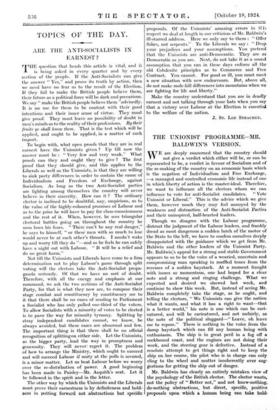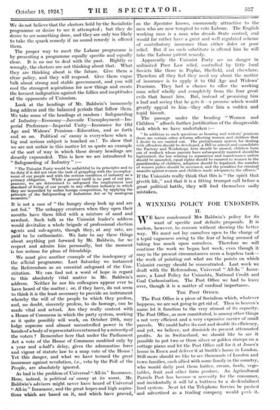THE UNIONIST PROGRAMME—MR. BALDWIN'S VERSION.
wE are deeply concerned that the country should not give a verdict which either will be, or can be represented to be, a verdict in favour of Socialism and of the re-making of the country on an economic basis which is the negation of Individualism and Free Exchange, —a managed and controlled economic life instead of one in which liberty of action is the master-ideal. Therefore, we want to influence all the electors whom we can influence to vote for anti-Socialist candidates. "Vote Unionist or Liberal." This is the advice which we give them, however much they may feel annoyed by the weakness and distraction of the Anti-Socialist Parties and their uninspired, half-hearted leaders.
Though •we disagree with the Labour programme, distrust the judgment of the Labour leaders, and frankly dread as most dangerous a sudden lurch of the motor of the State to the left, we have to confess ourselves deeply disappointed with the guidance which we get from Mr. Baldwin and the other leaders of the Unionist Party. Mr. Baldwin:s appeal for a strong and stable Government appears to us to be the voice of a wearied, uncertain and compromising man speaking in muffled tones from the recesses of a sodden haystack. At a moment fraught with issues so momentous, one had hoped for a clear note and a strong and ringing challenge. What we expected and desired we showed last week, and continue to show this week. But, instead of seeing Mr. Baldwin completely take the stage, as he ought, and telling the electors, "We Unionists can give the nation what it wants, and what it has a right to want—that is a better world," his note is one which can be cari- catured, and will be caricatured, and not unfairly, as the note of the political sluggard—" Leave, oh leave me to repose." There is nothing in the voice from the damp haystack which can fill any human being with enthusiasm. The ship is in great peril in a fog off a rockbound coast, and the engines are not doing their work, and the steering gear is defective. Instead of a resolute attempt to get things right and to keep the ship on .her course, the .pilot who is in charge can only cling to the wheel and mutter incoherently over sug- iestions for getting the ship out of danger.
Mr. Baldwin has clearly an entirely mistaken view of the psychology of the British elector. The elector wants, not the policy of "Better not," and not know-nothing, do-nothing abstractions, but direct, specific, positive proposals upon which a human being can take hold. We do not believe that the electors• hold by the Socialistic programme or desire to see it attempted ; but they do desire to see something done, and they are only too likely to take the quack remedy if no sound remedy is offered them.
The proper way to meet the Labour programme is by presenting a programme equally- specific and equally clear. It is no use to deal with the past. Rightly or wrongly, the electors are not thinking about that. What they are thinking about is the future. Give them a clear policy, and they will respond. Give them vague talk about strong and stable government, and you will cool the strongest aspirations for new things and create the keenest indignation against the follies and ineptitudes of the opponents of Unionism.
Look at the headings of Mr. Baldwin's immensely long address and the balanced periods that follow them. We take some of the headings at random : Safeguarding of Industry—Economy—Juvenile Unemployment—Im- perial Preference—Imperial Unity—Insurance for Old Age and Widows' Pensions—Education, and so forth and so on. Political ca' canny is everywhere when a big and serious subject is touched on ! To show that we are not unfair in this matter let us quote an example of the sort of way in which these dreary headings are drearily expounded. This is how we are introduced to Safeguarding of Industry" :— 'The Unionist Party would be unfaithful to its principles and to its duty if it did not treat the task of grappling with the unemploy- ment of our people and with the serious condition of industry as a primary obligation. While a general tariff is no part of our pro- gramme we are determined to safeguard the employment and standard of living of our people in any efficient industry in which they are imperilled by unfair foreign competition, by applying the principle of the Safeguarding of Industries Act or by analogous measures."
It is not a case of "the hungry sheep look up and are not fed." The unhappy creatures when they open their mouths have them filled with a mixture of sand and sawdust. Such talk as the Unionist leader's address would devitalize a whole brigade of professional election agents and sub-agents, though they, at any rate, are paid to be enthusiastic. We hate to say these things about anything put forward by Mr. Baldwin, for we respect and admire him personally, but the moment is too serious for pleas of friendship.
We must give another example of the inadequacy of the official programme. Last Saturday we instanced the Referendum as an essential safeguard of the Con- stitution. We can find not a word of hope in regard to this absolutely vital matter in Mr. Baldwin's address. Neither he nor his colleagues appear ever to have heard of the matter ; or, if they have, do not seem to think it is the least necessary to provide an instrument whereby the will of the people to which they profess, and, no doubt, sincerely profess, to do homage, can be made vital and actual. Are they really content with a House of Commons in which the party system, working as it quite possibly will work, on October 29th, may lodge supreme and almost uncontrolled power in the hands of a body of representatives returned by a minority of the voters ? Remember here that under the Parliament Act a vote of the House of Commons modified only by a year and a-half s delay, gives the adamantine force and vigour of statute law to a snap vote of the House ! Yet this danger, and what we have termed the great insurance against revolution, i.e., veto by the Poll of the People, are absolutely ignored.
As bad is the problem of Universal "All-in" Insurance. Here, indeed, is political Ca' canny at its worst. Mr.
Baldwin's advisers might never have heard of Universal 1. All-in " Insurance, and the great hopes and high aspira- tions which are based on it, and which have proved, as the Spectator knows, enormously attractive to the men who are now tempted to vote Labour. The English working man is a man who dreads State control, and would far rather have a great and well regulated scheme of contributory insurance than either doles or poor relief. But if no such substitute is offered him he will take the Labour patent remedy.
Apparently the Unionist Party see no danger in unlimited Poor Law relief, controlled by little local Soviets like those in Poplar, Sheffield, and elsewhere. Therefore all they feel they need say about the matter of insurance is to apply it to Old Age and Widows' Pensions. They had a chance to offer the working man relief wholly and completely from the four great evils that haunt him. But, instead of promising him a loaf and seeing that he gets it—a promise which would greatly . appeal to him—they offer him a sodden and tepid biscuit.
The passage under the heading "Women and Children" affords further justification of the disagreeable task which we have undertaken :— " In addition to such questions as housing and widows' pensions there are certain other reforms affecting women and children that I desire to see carried out. The probationary system for dealing with offenders should be developed, a Bill to amend and consolidate the Factory and Workshops Acts should be passed, children born out of wedlock whose parents have subsequently married should tie legitimized, the law relating to separation and maintenance orders should be amended, equal rights should be ensured to women in the guardianship of children adoption should be legalized, the number of women police should be increased, and the penalties for criminal assaults against women and children made adequate to the offence."
If the Unionists really think that this is "the spirit that giveth life," and that it is a fitting trumpet call before a great political battle, they will find themselves sadly mistaken.



























































 Previous page
Previous page